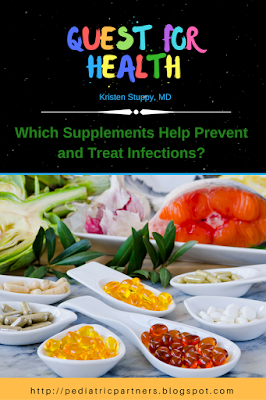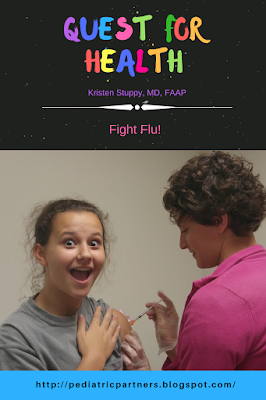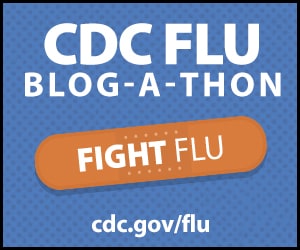All of these measures can help, but can we get more help from nutritional supplements or other natural remedies? What will boost our immune system?
I'm often asked if vitamin C, zinc, or essential oils will help various ailments or boost our immune system. I know that many people try natural products that are promoted to boost or support the immune system. They're hopeful that stimulating immune system activity will help the body fight off a virus. But research doesn't show that our immune system works that way. A virus can cause illness even in healthy people. If you want to read an in-depth summary of how our immune system works, the Skeptical Raptor has done a nice job discussing the complexities and why it's not as easy as eating healthy and taking supplements. Not to mention the fact that we don't necessarily want an overactive immune system, which is associated with allergies and autoimmune diseases.
One thing we need to remember first and foremost in the discussion of supplements is that this is an under-regulated industry. The FDA is not authorized to review dietary supplement products for safety and effectiveness before they are marketed. For this reason I hesitate to recommend supplements at all. Even though I do recommend Vitamin D supplements because studies support the need for additional Vitamin D in most people, I cannot endorse one particular product. Over the years many supplements, homeopathic products and herbs have been reported to have significant variances in amounts of product and unnamed contaminants, including lead and other hazards.
One thing we need to remember first and foremost in the discussion of supplements is that this is an under-regulated industry. The FDA is not authorized to review dietary supplement products for safety and effectiveness before they are marketed. For this reason I hesitate to recommend supplements at all. Even though I do recommend Vitamin D supplements because studies support the need for additional Vitamin D in most people, I cannot endorse one particular product. Over the years many supplements, homeopathic products and herbs have been reported to have significant variances in amounts of product and unnamed contaminants, including lead and other hazards.
Summaries of supplement and other "natural treatment" effectiveness:
- Probiotics may actually help prevent the number of infections. There are many, many types of probiotics, so further studies are needed on how to choose the best strain.
- Zinc has been shown to help prevent upper respiratory tract infections in children and teens and to decrease the duration of the common cold symptoms. It is best given as a lozenge to help with absorption. Intranasal zinc has been linked to a permanent loss of smell and should not be used. High doses can cause significant side effects, so talk to your doctor and pharmacist before supplementing.
- Nasal saline rinses show benefit in treating symptoms of upper respiratory tract infections. Learn how to do these correctly before trying it though. I often recommend Nasopure products as an unpaid endorsement. They're a local company with a very helpful website. Use their library to learn how to properly use nasal rinses in kids as young as 2 years of age.
- Honey may reduce the frequency of cough and improve the quality of sleep for children with the common cold. Honey should never be used in children younger than 1 year of age because of the risk of botulism.
- Echinacea has consistently been shown to be ineffective in many studies. I know that many people have heard of its benefits, so if you aren't convinced that you shouldn't waste money on it, see the NCCIH's Echinacea page.
- Garlic shows overall low evidence of benefit.
- Vitamin C can shorten the duration of illness mildly with daily supplementation.
- Chinese herbal medicines do not have high quality studies so effectiveness is unknown.
- Geranium extract (Pelargonium sidoides) has insufficient evidence of benefit for cold and cough symptoms.
- Turmeric's supposed anti-inflammatory properties have not been shown to be effective by research.
- Essential oils have the potential for beneficial effects – but they also have the potential for adverse reactions. Although they are touted as a cure for many ailments, published studies regarding the uses of aromatherapy have generally focused on its psychological effects on stress and anxiety or its use as a topical treatment for skin conditions. Both Young Living and dōTERRA have received warning letters from the FDA about improper marketing and unsubstantiated claims for uses of their oils. While many people think essential oils are safe, they can lead to significant problems. Some people suffer from allergic reactions to oils. They can increase sensitivity to the sun when applied topically. Tea tree oil and lavender have estrogen-like effects and caution should be used with these. Some of these substances can even lead to seizures, liver damage, and death if used improperly. Ingestion of the oils is a growing concern - as more households have them, more children are ingesting them.
Alice Callahan's “Immune-Boosting” Supplements Won’t Protect You from Back-to-School Germs is a great review of many of the supplements touted to prevent or treat illnesses. Her background in nutrition provides a solid base for reviewing claims that many of us don't understand completely.
Generally supplements are not recommended, but if you choose to use them, use them cautiously.
- Supplements contain a wide variety of ingredients - including vitamins, minerals, amino acids, and herbs. Research has confirmed health benefits of some dietary supplements but not others. The woo can be strong in this area, so be cautious where you get your information.
- Supplements have been known to include unlisted ingredients and to have inconsistent levels of product. When they are recalled, there is no mechanism in place to identify and notify people who have purchased affected products.
- Find a reliable source to evaluate effectiveness and risks. Some reports have shown that people who take supplements have higher risks of cancer, liver damage, birth defects, bleeding, and other health problems. When looking for information, use noncommercial sites (National Institutes of Health, Food and Drug Administration, US Department of Agriculture, National Center for Complementary Health) rather than depending on information from sellers.
- Natural does not mean safe. I've always said that I wouldn't give my picky eater marijuana to stimulate his appetite and encourage him to eat. Not even if it was organic. That usually gets the point across. You need to know the risks of a product, even if it's natural.
- If supplements will be taken, talk to your doctor and pharmacist about drug interactions. Sometimes it's difficult to know the risks because not all ingredients are included on the label and not all ingredients have been well studied, especially in combination with other supplements and medications.
- Most dietary supplements have not been tested in pregnant women, nursing mothers, or children. Remember just because something's natural doesn't mean it's safe. Arsenic is natural but I wouldn't advise taking it in high doses.
- If something sounds too good to be true, it probably is. There are no miracle cures. Avoid being manipulated by advertising. It's easy to fall prey because we all want to feel better quickly and parents want their kids to be healthy. But if it claims to be 100% effective or to have no side effects, it's probably false advertising. Personal accounts of something working are as likely to be based on bias or coincidence as to be from real benefit. Rely on large clinical studies that have been reproduced by other researchers. Dr. Chad Hayes has a very long, but wonderful post on how many of the integrative medicines are not simply not beneficial but potentially dangerous - Citations Needed: The curious “science” of integrative medicineMy experience at "Get Your Life Back NOW!"
This post isn't about antibiotics, but they don't work against viral illnesses any better than supplements. They don't prevent the development of ear infections or pneumonia, so even if your child seems to always develop these complications, your doctor should not prescribe them preventatively. Don't use antibiotics for routine upper respiratory infections, stomach bugs, and other viral illnesses.
Vaccines










